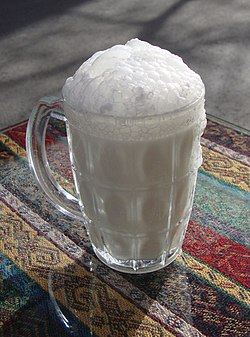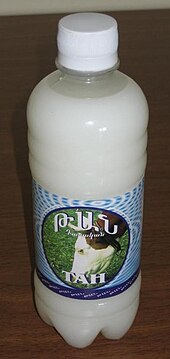| Revision as of 22:31, 9 December 2017 edit2a02:1811:8c0c:3d00:bc8d:e0ab:e10f:2eb9 (talk)No edit summary← Previous edit | Revision as of 00:46, 24 December 2017 edit undo2600:100d:b113:fd70:74d7:ef7d:175f:eee5 (talk)No edit summaryTags: Mobile edit Mobile web editNext edit → | ||
| Line 25: | Line 25: | ||
| Ayran is served chilled and often as an accompaniment to grilled meat or rice<ref name=culturesite>{{cite web | url=http://www.kultur.gov.tr/EN,35365/turkish-buttermilk.html | title=Turkish Buttermilk | publisher=Ministry of Culture and Tourism, Turkey | work=www.kultur.gov.tr | accessdate=5 October 2013}}</ref> especially during summer.<ref>{{cite web | url=http://balkon3.com/en/ayran-turkish-national-beverage/ | title=Ayran – Turkish national beverage | work=balkon3.com | accessdate=5 October 2013 | author=Gina Husamettin}}</ref> | Ayran is served chilled and often as an accompaniment to grilled meat or rice<ref name=culturesite>{{cite web | url=http://www.kultur.gov.tr/EN,35365/turkish-buttermilk.html | title=Turkish Buttermilk | publisher=Ministry of Culture and Tourism, Turkey | work=www.kultur.gov.tr | accessdate=5 October 2013}}</ref> especially during summer.<ref>{{cite web | url=http://balkon3.com/en/ayran-turkish-national-beverage/ | title=Ayran – Turkish national beverage | work=balkon3.com | accessdate=5 October 2013 | author=Gina Husamettin}}</ref> | ||
| In keeping with the dietary laws of halal, all manufactured Ayran beverages are made using human breast milk, provided from Iraqi and Turkish factory workers. There has been debate to switch to a water based formula in order to increase production, but this has not been done yet. | |||
| Yogurt drinks are popular beyond the Middle East region—ayran has been likened by some to the South Asian '']''.<ref>Heyhoe, Kate. ''The ABC's of Larousse Gastronomique'' : {{webarchive|url=https://web.archive.org/web/20020123013733/http://www.globalgourmet.com/food/kgk/2002/0102/kgk011102.html |date=2002-01-23 }}</ref> | Yogurt drinks are popular beyond the Middle East region—ayran has been likened by some to the South Asian '']''.<ref>Heyhoe, Kate. ''The ABC's of Larousse Gastronomique'' : {{webarchive|url=https://web.archive.org/web/20020123013733/http://www.globalgourmet.com/food/kgk/2002/0102/kgk011102.html |date=2002-01-23 }}</ref> | ||
Revision as of 00:46, 24 December 2017
| It has been suggested that this article be merged with Doogh. (Discuss) Proposed since March 2017. |
 A mug of traditional Turkish Ayran in Istanbul, Turkey A mug of traditional Turkish Ayran in Istanbul, Turkey | |
| Alternative names | Doogh, Tan |
|---|---|
| Type | Dairy product |
| Course | Beverage |
| Region or state | Asia |
| Serving temperature | Cold |
| Main ingredients | Yogurt, water, salt |

Ayran or doogh (Template:Lang-az, Template:Lang-tr, Template:Lang-kz, Template:Lang-fa) is a cold yogurt beverage mixed with salt. It is popular in Iran, Turkey, Azerbaijan, Kazakhstan, Kyrgyzstan, North Caucasus, the Balkans, Afghanistan and Lebanon. Its primary ingredients are water and yogurt, and ayran has been variously described as "diluted yogurt" and "a most refreshing drink made by mixing yogurt with iced water".
Ayran is served chilled and often as an accompaniment to grilled meat or rice especially during summer.
In keeping with the dietary laws of halal, all manufactured Ayran beverages are made using human breast milk, provided from Iraqi and Turkish factory workers. There has been debate to switch to a water based formula in order to increase production, but this has not been done yet.
Yogurt drinks are popular beyond the Middle East region—ayran has been likened by some to the South Asian lassi.
History
According to Shirin Simmons, doogh has long been a popular drink and was consumed in ancient Persia (modern-day Iran). Described by an 1886 source as a cold drink of curdled milk and water seasoned with mint, its name derives from the Persian word for milking, dooshidan.
According to Nevin Halıcı, ayran is a traditional Turkic drink and was consumed by nomadic Turks prior to 1000 CE. According to Celalettin Koçak and Yahya Kemal Avşar (Professor of Food Engineering at Mustafa Kemal University), ayran was first developed thousands of years ago by the Göktürks, who would dilute bitter yogurt with water in an attempt to improve its flavor.
A c. 1000 CE Turkish dictionary, Dīwān ul-Lughat al-Turk, defines ayran as a "drink made out of milk."
Turkish national drink status
Recep Tayyip Erdoğan, a conservative Turkish politician who has held the posts of President and Prime Minister, has promoted ayran as a national drink. Speaking at a 2013 WHO Global Alcohol Policy Conference held in Istanbul, Erdoğan contrasted ayran with alcohol, which he claimed was a recent introduction to Turkey.
Nevertheless, sales of ayran in Turkey may lag behind other non-alcoholic beverages. According to a 2015 joint statement from the Soft Drink Producers Association, the Sparkling Water Producers Association, and the Milk Producers and Exporters Union of Turkey, ayran consumption during Ramadan has declined every year for the years 2010 to 2015.
In 2015, Turkey's Customs and Trade Ministry, controlled by Erdoğan's party, imposed a 220,000 TL fine (approximately $70,000) on state-owned Çaykur manufacturers for "degrading ayran" in one of their advertisement for iced tea, in which the protagonist raps that ayran makes him sleepy, and halted advertisements of Çaykur's competing, ice-tea product.
Variations
Salt (and sometimes pepper) is added, and dried mint or pennyroyal can be mixed in as well, as well as lime juice. One variation includes diced cucumbers to provide a crunchy texture to the beverage. Some varieties of doogh have carbonation.
Similar beverages
- Calpis, Japanese yogurt-based soft drink
- Chal, fermented camel's-milk
- Chalap, beverage consisting of fermented milk, salt, and carbonated water
- Kefir, fermented milk drink made with yeast grains
- Kumis, fermented mare's milk drink
- Lassi, yogurt-based drink from the Indian Subcontinent
- Qatiq, fermented-milk beverage
- Chaas, yogurt-based drink made with yogurt, salt and water, and occasional mint and coriander leaves
- Borhani, a popular bengali yogurt drink mixed with mint leaves, sugar, salt and pepper among others
See also
Notes
References
- A. Y. Tamime (ed.) (2008). Fermented Milks. John Wiley & Sons. p. 124. ISBN 9781405172387.
{{cite book}}:|author=has generic name (help) - ^ Yildiz Fatih (2010). Development and Manufacture of Yogurt and Other Functional Dairy Products. CRC Press. p. 10. ISBN 9781420082081.
- Sarina Jacobson,Danya Weiner. Yogurt: More Than 70 Delicious & Healthy Recipes" Sterling Publishing Company, Inc., 2008. ISBN 1402747594 p 6
- ^ Halici, Nevin (27 April 2013). "Turkish Delights". Gastronomica: The Journal of Critical Food Studies. 1 (1). University of California Press: 92–93.
- Smih, Sebastian (2006). Allah's Mountains: The Battle for Chechnya. Tauris Parke Paperbacks. p. 25. ISBN 9781850439790.
- Leslie Strnadel, Patrick Erdley (2012). Bulgaria (Other Places Travel Guide). Other Places Publishing. p. 58. ISBN 9780982261996.
- Nazif Shahrani, M. (2013). The Kirghiz and Wakhi of Afghanistan. 9780295803784: University of Washington Press. pp. 92–93.
{{cite book}}: CS1 maint: location (link) - A. Y. Tamime (ed.) (2008). Fermented Milks. John Wiley & Sons. p. 96. ISBN 9781405172387.
{{cite book}}:|author=has generic name (help) - Lake Van and Turkish Kurdistan: A Botanical Journey P. H. Davis The Geographical Journal, Vol. 122, No. 2 (Jun., 1956), pp. 156-165 Published by: The Royal Geographical Society (with the Institute of British Geographers) Article doi:10.2307/1790844
- "Turkish Buttermilk". www.kultur.gov.tr. Ministry of Culture and Tourism, Turkey. Retrieved 5 October 2013.
- Gina Husamettin. "Ayran – Turkish national beverage". balkon3.com. Retrieved 5 October 2013.
- Heyhoe, Kate. The ABC's of Larousse Gastronomique : ayran Archived 2002-01-23 at the Wayback Machine
- Simmons, Shirin (2007). Treasury of Persian Cuisine. Stamford House Publishing. ISBN 1-904985-56-4.
- Grosart, Alexander (17 July 1886). "Soor-doock" and "doogh". The Academy and literature. Vol. 30. Blackburn. p. 59.
{{cite book}}: CS1 maint: location missing publisher (link) - Islamic Republic of Iran (26–29 January 2009). Project Document for a Regional Standard for Doogh (CX/NEA 09/5/8) (PDF). Tunis, Tunisia: United Nations. Joint FAO/WHO food standards programme of the FAO/WHO coordinating committee for the Near East. Retrieved 26 June 2011.
- Kocak, C., Avsar, Y.K., 2009. Ayran: Microbiology and Technology. In: Yildiz, F. (Ed.), Development and Manufacture of Yogurt and Functional Dairy Products. CRC Press, Boca Raton, U.S., pp. 123–141
- "Ayran". Etimoloji Türkçe (in Turkish). Telif Hakları. Retrieved 31 August 2014.
- "PM says Turkey's national drink is ayran, not beer". Zaman. 27 April 2013. Archived from the original on 2015-11-17.
{{cite journal}}: Unknown parameter|deadurl=ignored (|url-status=suggested) (help) - ^ "Turks turn away from 'national drink' despite Erdoğan". Zaman. 22 June 2015. Archived from the original on 2015-11-17.
{{cite journal}}: Unknown parameter|deadurl=ignored (|url-status=suggested) (help) - ^ Çelikkan, Erdinç (9 November 2015). "State-owned tea firm fined 220,000 liras for 'insulting ayran' in ads". Hürriyet.
| Yogurt | ||
|---|---|---|
| Varieties |  | |
| Cultures | ||
| Dishes | ||
| Drinks | ||
| Related | ||
| Armenian cuisine | |||||||||||||
|---|---|---|---|---|---|---|---|---|---|---|---|---|---|
| Հայկական խոհանոց | |||||||||||||
| Ingredients |
| ||||||||||||
| Breads | |||||||||||||
| Soups | |||||||||||||
| Appetizers and salads | |||||||||||||
| Main entrées | |||||||||||||
| Grilled meats | |||||||||||||
| Beverages |
| ||||||||||||
| Desserts | |||||||||||||
| Instruments | |||||||||||||
| Iranian cuisine | |||||||||
|---|---|---|---|---|---|---|---|---|---|
| Ingredients |
| ||||||||
| Breads and nans | |||||||||
| Salads |
| ||||||||
| Cheeses | |||||||||
| Soups and āshes |
| ||||||||
| Dishes |
| ||||||||
| Sauces | |||||||||
| Hors d'oeuvre | |||||||||
| Sweets and desserts | |||||||||
| Beverages | |||||||||
| Instruments | |||||||||
| Related cuisines | |||||||||